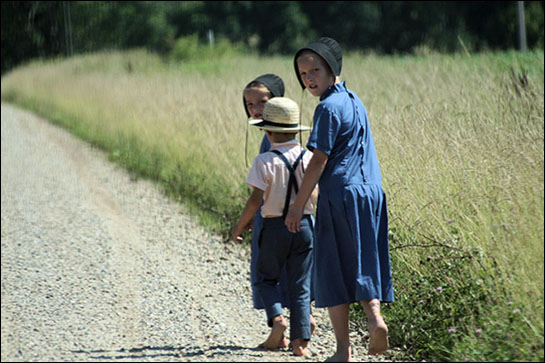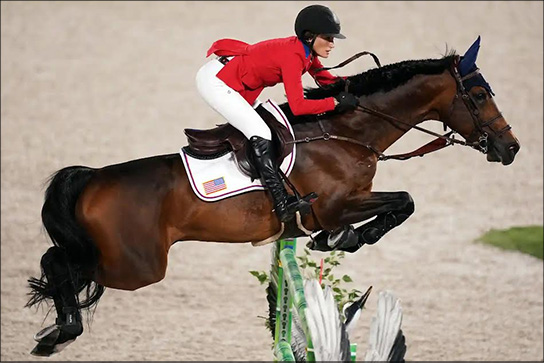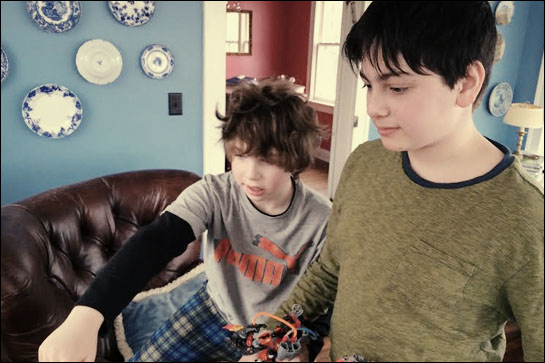Should homeschool emphasize the family or individual?

I started homeschooling because it seemed like a total waste of time to send my kids away from me to do something that wasn’t working anyway. I wanted my family to be about being together, day in and day out.
When we lived on the farm, we were in the center of a huge Amish community, where the community comes first, then the family, then the kids. The kids all wear the same clothes, and they work all day on the farm. There is little sense that each child is an individual. It’s just not relevant to the community.
As a firsthand observer, I was impressed with the community’s cohesion. No one is left alone, everyone works together, and each person has a place in the group.
As a latchkey kid, I felt like I lost my family to my parents’ obsession with their individual career achievements, and I was saved by the community’s sense of duty.
As a parent, I am always trying to navigate where I want to stand in the spectrum of individual versus community.
Proctor & Gamble’s classic Olympic series about thanking moms makes sense to me. It’s clear that incredible talent requires an incredible family system to cultivate it. The kids are all effusively grateful, because now that they are grown, they realize their moms gave up a lot to drive them to practice and tournaments, invariably taking their kids out of school so they would not be distracted from pursuing their dreams.
Of course, if a mom makes that sacrifice for one kid, the whole family makes that sacrifice. And when I first read stories about the sacrifices families make for the Olympic dreams of kids, I thought to myself, “This is nuts. It’s not worth it.”
Then I found myself doing what they did, for cello.
I would not like to be part of an Amish family, but I also question the virtue of being the family of a child prodigy. The time and expense that makes individual achievement so incompatible with family and community is mostly tied to travel.
I wonder if that will change when we stop going into the office. If we rarely go into the office, then we can stop relocating for new jobs. Then we can live in a single community for most of our childhood, and then relocate once or twice, before we settle in for adult life.
This lifestyle is better for climate and attachment, and it’s how we evolved. It also seems to promote a happy balance between becoming both a valuable member of the community and becoming an individual who makes self-assured attachments as an adult.
Then the life of a snow-chasing Olympic skier or a teacher-hopping violinist would seem outlandish. Homeschooling is interesting to me because it’s the refusal to give the school primacy over family when there is no proven benefit. But to save the family from school and then destroy the family with individual obsession is probably not what I meant to do either. I just didn’t realize that until it started happening.



So, what’s the alternative? There are interests that develop along with a child’s development—if they wait to start when their bodies are older, it’s too difficult to train/learn all that needs to be done in order to reach a level of excellence. And, who says a family has to be destroyed in the process? There are many prodigies of all kinds who have in-tact families. Not every child is a prodigy, even when they start early. Some just have an interest until they’ve satisfied it and look to dive into something else. I think one of the mistakes parents make is hoping that the child’s interest/talent will become their career—pouring all the family resources into career development long before the child has ever thought about turning their interest into their life’s work. Encouraging a child’s development because the child is interested does not have to become a resource-guzzling monster. The child does not necessarily have the ability to see the long road and what they might face. Parents who do might deplete the family’s resources by trying to avoid some of the obstacles. Kids need to learn to deal with those challenges when they come up, not have the way paved smooth for them by their parents. Not every professional musician studies at Juilliard and not every gold medalist has a well-known coach. A balanced, resilient family can raise balanced, resilient children without destruction.